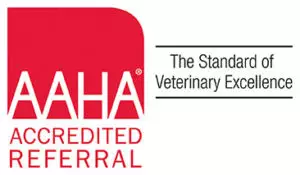Hip Dysplasia
What is hip dysplasia?
Hip dysplasia is one of the most common orthopedic conditions seen in dogs. While this condition typically affects large and giant breeds, any size dog, and even cats, may be affected. Hip dysplasia is the abnormal growth and development of the hip joint. The hip joint is a “ball and socket” joint. The ball is the head of the femur. The socket is part of the pelvic bone, the acetabulum. Normally, the head of the femur fits very tightly within the acetabulum. In hip dysplasia, the joint does not fit together snugly, causing instability. As a result, the joint will partially subluxate or move in and out of the socket. This may cause cartilage damage and severe arthritis in dogs as early as one year of age.
What are the signs and symptoms of hip dysplasia?
- Reluctance to exercise
- “Bunny hop” on stairs
- Swaying gait or wiggling of hips as they walk
- Short steps in either hind leg
- Slowness getting their rear end off the floor
- Slowness lying down
- Difficulty climbing stairs or jumping
- Lameness (limping) prevalent first thing in the morning
- Tendency to worsen after heavy exercise, usually noticed the next day
- More severe symptoms seen on cold and wet days
Dr. Dominic J. Marino pioneered the development of both micro and nano hip replacements and has performed over 2,000 hip replacements in dogs, cats and pot-bellied pigs.
He has published many scientific articles, and authored chapters in both veterinary and human medical textbooks He lectures extensively both nationally and internationally on many surgical topics including soft tissue, orthopedic, and neurosurgery, as well as tactical veterinary medicine at both human and veterinary conferences.
Dr. Marino is the director of The Canine Chiari Institute at Long Island Veterinary Specialists and on the board of directors of The New York Veterinary Foundation, Veterinary Recommended Nutraceuticals, and the Police Surgeons Benevolent Association. Dr. Marino is a board of trustee member and served as chairman of the scientific advisory board of the Chiari Syringomyelia Foundation.
Treatment options for hip dysplasia
Hip Dysplasia Treatment Options at LIVS
Our team can perform a wide range of procedures to address your pet's hip dysplasia, including:
Weight Management:
Weight management is extremely important for all pets. In hip dysplasia cases, obesity adds additional stress on already abnormal hips. Added soreness and accelerated arthritis is also likely.
Non-Steroidal Anti-Inflammatory Drugs (NSAIDS):
Anti-inflammatory medications and injections may be used to manage discomfort and soreness for pets with hip dysplasia.
Chondroprotective Agents:
Controlled Exercise:
Exercise must be controlled for conservative therapy to be effective. Unrestricted running, jumping and roughhousing must be prohibited. When soreness flares up, exercise should be extremely limited for a few days.
Saving the Natural Joint
Triple pelvic osteotomy (TPO) is a surgical procedure designed to save the natural joint by reducing or eliminating the laxity. With TPO, the pelvis is cut in three places so the acetabulum can be rotated over the head of the femur to prevent it from slipping out of the socket or sub luxating. TPO is not appropriate for all dogs and works best in dogs that have hip laxity with minimal arthritis present. Dogs are usually younger (5-12 months old) when this procedure is performed, prior to significant bone arthritis formation. Typically, both hips are operated on in two separate surgeries. Exercise must be restricted for 2-3 months to allow the pelvic bones to heal after surgery.Removing Part of the Natural Joint
FHO surgery is successful in eliminating discomfort. However, approximately one-third of owners report that their dogs continue to limp intermittently, have some muscle atrophy (thinning) in the operated leg, and have decreased range of motion
Replacing the Natural Joint
Cemented, Cementless, and Hybrid Total Hip Replacements
Cemented, cementless, and hybrid hip replacement procedures are available at LIVS. Cemented components have the benefit of instant strength immediately after surgery and can fit many different bone shapes.
Cementless components have the advantage of less foreign material being needed and more bone-in-growth over the years. Hybrid components offer some advantages from both systems.
Dr. Marino will decide which implants will best serve your pet’s needs at the time of surgery. It may then be determined that a hip replacement is not in your pet’s best interest. In those rare circumstances, a femoral head and neck ostectomy will be performed.
Photo: This radiograph (x-ray) shows a hybrid total hip replacement.
Micro & Nano Total Hip Replacements
Until recently, traditional hip replacement patients had to weigh at least 35 pounds to benefit from this advanced procedure. Approximately 10% or more of the dogs that are presented for hip arthropathies and all cats were historically too small for hip replacement prosthesis insertion. Now, micro implants have been developed to accommodate patients as small as 5 pounds!
Working with BioMedtrix, Dr. Marino helped develop micro and nano implants to accommodate patients of various sizes, ranging from 1 pound to 275 pounds! Only a handful of surgeons in the world perform micro and nano hip replacements and Dr. Marino was the first on the East Coast to perform this surgical procedure.
Surgery Team

Catherine A. Loughin, DVM
Dip. ACVS, Dip. ACCT
Soft Tissue, Oncologic,
Orthopedic, Neurosurgery

Dominic J. Marino, DVM
Dip. ACVS, Dip. ACCT, CCRP
Soft Tissue, Oncologic, Orthopedic, Neurosurgery, Physical Rehabilitation

Robert Waddell, DVM
Dip. ACVS-SA
Soft Tissue, Oncologic,
Orthopedic, Neurosurgery


